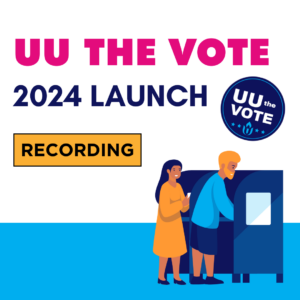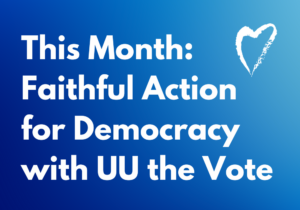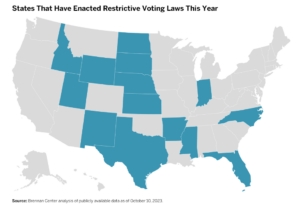Introduction
District attorneys wield substantial power, including discretion over general law enforcement priorities, what criminal cases are prosecuted, which cases are dismissed or never pursued, whether bail is requested for defendants, and what punishments the state requests. District attorneys’ responsibilities may also include advising local government officials on legal matters, advocating for the rights of crime victims, and protecting childrens’ welfare.
In various jurisdictions, the office may be called county attorney, solicitor, prosecuting attorney, state’s attorney, or other titles, but here we’ll use the common term of DA (for district attorney) or DA. In many jurisdictions, a DA represents a county or region, as well as the state.
The DA is directed, by law, to protect the rights of the accused. Their selection impacts a wide range of vital issues, including civil rights, racial justice, police practices, treatment of immigrants, drug policy, reproductive rights, LGBTQ+ rights, and environmental laws. In many states, DAs also are empowered to seize a person’s property based merely on suspicion of it being used in committing a crime — a practice known as civil asset forfeiture.
These responsibilities give DAs power to either enable or block the realization of core Unitarian Universalist (UU) values, like justice, equity and compassion in human relations, and honoring the inherent worth of all people. The DA handles key decisions that often perpetuate racial injustice, systemic oppression of the poor, and marginalize LGBTQ+ and people with disabilities, but the office also can be crucial to achieving positive reforms.
Too often, DAs have blocked or lobbied state legislatures to oppose grassroots demands for changes to justice systems, including efforts to eliminate cash bail, hold police accountable for their actions, reduce incarceration, and other steps to advance justice. Notably, a 2019 study found 95 percent of all elected prosecutors were white and 79 percent were white men. Local prosecutors often advance to State Attorney General or higher elected offices, so these selections often impact public policy long-term. In a recent U.S. Congress, 47 members were former prosecutors!
While some states allow the chief executive of a jurisdiction to appoint these prosecutors, local voters most often enjoy this power. Despite their importance, DA election races typically generate minimal media attention, and many voters choose whether to cast a vote and for whom based only on party identification and name recognition. This combination of high influence on key justice issues and modest media attention makes DA races an excellent prospect for local congregations and groups to spotlight key issues. Below, we provide sample questions for a candidate survey — a tool you can use to spotlight key issues and ensure they are discussed.
Because of variance among state constitutions, local powers, current issues, and political composition, your survey will be most effective if your group includes some data and examples specific to your community and state.
Candidate surveys (or forums) should be a nonpartisan effort to educate the public on key criminal justice issues and encourage accountability for candidates. Local congregations and all non-profit 501(c)(3) organizations must avoid partisanship and cannot endorse candidates but may educate potential voters on issues and help people see candidates’ positions on matters of interest. Your questionnaire must go to all ballot-qualified candidates running for an office, and the questionnaire should be posted online. Use (almost all) open-ended questions and include a response deadline, word limits and clear instructions.
We suggest you publish their entire response without any changes — even for clarity or grammar. Follow up promptly to confirm receipt of responses and let respondents know when you will publicize the results.
Unless you have an expert within your group, Google Forms is likely the simplest method for disseminating your questionnaire and collecting responses. Here’s a thorough video tutorial on creating questionnaires via Google.
Examples of choices a DA can make
- Decline to prosecute a class of cases (e.g. simple drug possession)
- Decline to prosecute alleged violations of anti-abortion laws
- Decline to prosecute parents for seeking gender-affirming surgery for their children
- Consider immigration status and consequences when deciding on charging a suspect
- Prioritize enforcement of laws that do most harm to the most people (often considered “white collar crimes”), such as wage theft, illegal waste dumping, workplace safety
- Choose to prosecute environmental and public health crimes
- Consider racial disparities in arrest rates and involved officers before charging any suspect
- Whether to charge a police officer for criminal conduct
- Decide to eliminate cash bail for misdemeanors
- Advise the County or local government on voting practices
- Advise the County or local government on land-use planning
- Determine how to care for those suffering with mental illness
Potential Questions for Your Candidate Questionnaire
We suggest choosing just a few of these to include along with issues specific to your community
- What motivated you to run for this office and what do you consider the most pressing concerns of the position?
- How will you make data and cases transparent in order for people to assess racial disparities, economic disparities and easily see which crimes police enforce and ignore?
- How will the public be informed when officers are investigated for having lied in a police report, warrant application, or any other official context?
- Will you pledge to reduce incarceration by a specific percentage within your first year/term?
- Do you support shifting resources away from policing and toward programs that would dispatch trained, unarmed professionals as first responders to provide de-escalation and intervention in situations involving mental health issues? E.g. calls involving a person with mental health issues OR Is it appropriate for lethally armed police officers to be the first responders to a mental health incident?
- What role can your office play in improving access to mental health services and helping people before crises that may require public interventions?
- Nationally, more than nine out of 10 prosecuted cases are resolved by plea bargains. This process is often coercive for people lacking wealth. How will you ensure plea bargains will be used without coercion and not pressure any innocent person into a guilty plea?
- (where applicable) Do you intend to expend resources to prosecute people who seek abortion care to terminate a pregnancy? Healthcare providers who provide abortion care? Others who assist people to access abortion care?
- How will you allocate resources between pursuing “white collar” crimes like illegal dumping or wage theft (which dwarfs the economic costs of street crimes) vs crimes by lower income people, like shoplifting. (See Questions to Ask Police Chiefs by Alec Karakatsanis for many more ideas re setting priorities and allocating resources that might be relevant to adapt for your local DA race).
- Would you prosecute environmental crime, such as _______, in your area? Under what scenarios?
- (If local police engage in the activity). Tell us your views on civil asset forfeiture (seizing property based on suspicion of use for criminal activity).
- Would you consider using restorative or transformative justice principles in sentencing recommendations or plea bargains? In what situations?
- Would you like to share other ideas on how you will use the power of your office to advance justice?
How to Deploy Your Candidate Questionnaire
Getting candidates to respond may require multiple contacts and we suggest one person be charged with candidate contact and follow-up. Consider partnering with other organizations to increase the perceived importance of your questionnaire. You can make it compelling by informing the campaigns of your timeline, how their responses will be shared, and the size of your audiences (newsletters, social media…). Share your plans for publicizing the results in the media beyond your organization(s) own websites, social media, or publications.
You may opt to include some additional information on candidates. This could include:
- Your congregation/coalition’s views on specific issues
- Candidate photos
- Summaries of candidates’ experience and affiliations
- Previous actions or decisions candidates have made re your issues of interest
If you decide to move forward with creating a questionnaire, please tell us! We may be able to connect you to others planning action or offer state-specific resources. We are happy to offer feedback on a final draft of your questionnaire before you import it into a form.
| Additional Resources |
The Candidate Questionnaire in 2022 – a media perspective Writing Words That Inspire: How to Craft and Publish Compelling Letters to the Editor – the questions in this guide, with or without answers, can make great points in letters to the editor Across America, The Single Most Powerful Person in Local Criminal Justice Systems Operates With Near Impunity – background reading on the lack of accountability for local prosecutors |
We’d love to hear your ideas or questions! Email Jeff Milchen, UUA Justice Communications Associate, at [email protected]







